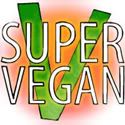
On this Earth Day 2009, what have you done to "Green" your life? Maybe you have started recycling, using less water in the shower or garden, using energy-efficient light bulbs, bringing your own bags to the market, buying locally-grown foods, or riding your bike to get around town. All these things applied to your daily life can help a great deal but did you know that nothing will benefit the planet nearly as much as switching to a vegan diet? Yeah it helps you get healthier like no cholesterol, low fat, easier digestion AND you reduce your carbon footprint! If you feel you're not ready to take the plunge just yet, or ever, even adopting a vegan diet for a few days a week, or 1 meal a day, you could dramatically improve your health as well as helping out mother earth. You may even be able to keep driving that SUV - it does less to the earth then the following:
- A United Nation report in 2006 claims that the “livestock sector” generates more greenhouse gas emissions than all the cars, trucks, trains, ships, and planes in the world combined. This industry is one of the largest sources of carbon dioxide and the single largest source of both methane and nitrous oxide emissions. Nitrous oxide is considerably more potent as a greenhouse gas than carbon dioxide. According to the U.N., the meat, egg, and dairy industries account for an eye opening 65 percent of nitrous oxide emissions.
- As mentioned, cutting back on animal product consumption can help combat climate change. Chris Weber, a professor of civil and environmental engineering at Carnegie Mellon University, says that not eating red meat and dairy products is the equivalent of not driving 8,100 miles in a car that gets 25 miles to the gallon. While buying local meat may sound like it may help, only five percent of food-related emissions come from the actual transportation of the product.
- Environmental Defense has revealed estimates that, “If every American skipped one meal of chicken per week and substituted vegetables and grains … the carbon dioxide savings would be the same as taking more than half a million cars off of U.S. roads. … If every American had one meat-free meal per week, it would be the same as taking more than 5 million cars off our roads. Having one meat-free day per week would be the same as taking 8 million cars off American roads.” Who needs ethanol now?
- The Live Earth Global Warming Survival Handbook points out that “refusing meat” is “the single most effective thing you can do to reduce your carbon footprint.” Researchers at the University of Chicago have found that going vegan is more effective in countering climate change than switching from a standard American car to a Toyota Prius. 2 other great books about food affecting our bodies and our environment is Food Revolution by John Robbins and Mad Cowboy by Howard Lyman. Both authors lived and worked in the eat and dairy industry making their information and message incredibly poignant.
Among the benefits to our climate in adopting a vegan diet, the environmental benefits are just as extraordinary. The U.N. report stated that the meat industry is “one of the … most significant contributors to the most serious environmental problems, at every scale from local to global.”
- Almost half of the water used in the U.S. is used by the animal agriculture industry. From watering the crops grown to feed farmed animals, providing drinking water for billions of animals each year, and cleaning the factory farms, transport trucks, and slaughterhouses, the farmed animal industry places a serious strain on our water supply. According Newsweek, “The water that goes into a 1,000-pound steer would float a destroyer.” It takes more than 4,000 gallons of water per day to produce a meat-based diet, but only 300 gallons of water a day are needed to produce a vegan diet ; )
- A vegan diet not only helps conserve water, it helps reduce water pollution. The Environmental Protection Agency has found that animal factories pollute our waterways more than all other industrial sources combined. Cows, pigs, chickens, and other animals raised for food produce approximately 130 times as much excrement as the entire human population. Crappy, huh?
- A Scripps Howard synopsis of a Senate Agricultural Committee report on farm pollution issued this warning about animal waste: “[I]t’s untreated and unsanitary, bubbling with chemicals and diseased.…It goes onto the soil and into the water that many people will, ultimately, bathe in and wash their clothes with and drink. It is poisoning rivers and killing fish and making people sick.… Catastrophic cases of pollution, sickness, and death are occurring in areas where livestock operations are concentrated.… Every place where the animal factories have located, neighbors have complained of falling sick.”
- More than one-third of all the fossil fuels produced in the U.S. are used to raise animals for food. It takes an exorbitant amount of energy to turn animals into food, so much so that it far exceeds the amount of cars on the road.
- Massive amounts of grains and soybeans are grown to feed farmed animals. Close to 1.4 billion people could be fed with the grain and soybeans fed to U.S. cattle alone. The Worldwatch Institute says, “[M]eat consumption is an inefficient use of grain—the grain is used more efficiently when consumed by humans. Continued growth in meat output is dependent on feeding grain to animals, creating competition for grain between affluent meat-eaters and the world’s poor.”
- We could produce more food for more people if we stopped squandering our resources to raise animals. It takes 3 1/4 acres of land to produce food for a meat-eater while food for a vegan can be produced on only 1/6 of an acre of land. For real!!
- According to the U.N., livestock production accounts for 70 percent of all agricultural land and 30 percent of the land surface of the planet. The U.N. report explains that the “[e]xpansion of livestock production is a key factor in deforestation, especially in Latin America, where the greatest amount of deforestation is occurring—70 percent of previous forested land in the Amazon is occupied by pastures, and feedcrops cover a large part of the remainder.”
I adopted a vegan lifestyle over 10 years ago now and I did it for health. Health is still my number one reason for being vegan although I am happy that my personal reasons for becoming so have also created a positive impact on our world as well as the animals!
Happy Earth Day everyone and remember, every little change helps a lot!!
Facts, quotes and information from"Meat's Not Green: This Earth Day, Go Vegetarian to Save the Planet" by RaeLeann Smith




















